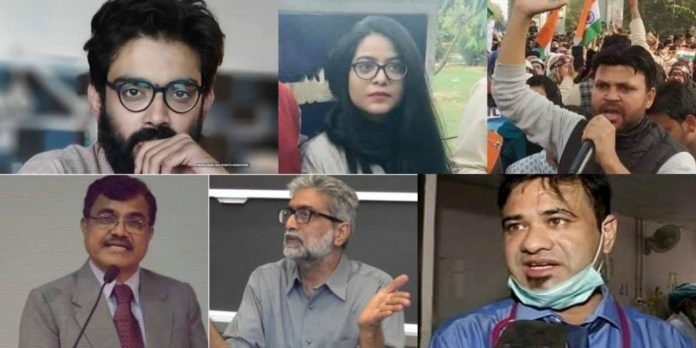The European Parliament Subcommittee on Human Rights has written to Union Home Minister Amit Shah expressing concern about the recent arrests of activists Anand Teltumbde and Gautam Navlakha by the National Investigative Agency and urged India to immediately release all political prisoners in view of the coronavirus pandemic. The activists are accused in the Bhima Koregaon case.
Head of the European Parliament’s Subcommittee on Human Rights (DROI), Maria Arena shot off a letter to Shah on May 28, expressing her concerns over the arrest of activists Gautam Navlakha and Anand Teltumbde.
“It is particularly alarming to note that human rights defenders cannot conduct advocacy activities, notably in favor of India’s poorest and most marginalized communities,” said Arena in her letter. Arena slammed the Modi government for portraying anti-CAA protesters as terrorists also.
“To date, the European Parliament has noticed that various forms of legitimate peaceful protests against laws, policies and governmental actions, including the Citizenship Amendment Act, have been portrayed as terrorist activities under this legislation, resulting in a number of arrests under this umbrella,” reads the letter.
She demanded, “India should do much more to ensure a safe and conducive environment for civil society working in the country also.”
Here is the full text of Arena’s letter:
Dear Minister,
I am writing to you in my capacity as Chair of the European Parliament’s Subcommittee on Human Rights (DROI), a parliamentary body that actively monitors human rights developments across the globe and publicly advocates in favor of respect for fundamental rights.
It is in this context that we are closely following the protection of human rights defenders in India and wish to express serious concerns about the recent arrests of Anand Teltumbde and Gautam Navlakha by the National Investigative Agency.
It is particularly alarming to note that human rights defenders cannot conduct advocacy activities, notably in favor of India’s poorest and most marginalized communities, without becoming subject to intimidation and harassment, but equally worrying is the fact that terrorism charges, including under the Unlawful Activities Prevention Act (UAPA), are used to silence them.
As pointed out by United Nations Special Procedures, this clearly represents a violation of international human rights standards.
To date, the European Parliament has noticed that various forms of legitimate peaceful protests against laws, policies and governmental actions, including the Citizenship Amendment Act, have been portrayed as terrorist activities under this legislation, resulting in a number of arrests under this umbrella.
This is notably the case for human rights activists such as Safoora Zargar, Gulfisha Fatima, Khalid Saifi, Meeran Haider, Shifa-Ur-Rehman, Dr Kafeel Khan; Asif Iqbal and Sharjeel Imam who were recently arrested by the Police.
Against this background, there are also increased fears that the legislation might confer discretionary powers upon State agencies.
Indeed, the vague definition of ‘unlawful activities’ and ‘membership of terrorist organisations’ could allow for wide discretion by the government in applying the law. Such a process would substantially weaken judicial oversight and the protection of civil liberties in the country.
Consequently, we strongly believe that measures should be urgently taken to stop impeding and criminalizing the work of human rights defenders by means of overly broad national security legislation and to respect their freedoms of association and expression.
India should do much more to ensure a safe and conducive environment for civil society working in the country and consider enacting a law on the protection and promotion of human rights defenders.
The unprecedented situation of the COVID-19 pandemic has led to repeated calls by the United Nations for the immediate release of prisoners of conscience as part of overall efforts to contain the outbreak.
This collective endeavour was echoed by the Subcommittee on Human Rights during its meeting of 11 May 2020. We trust that it is our common duty and responsibility to protect human rights without discrimination and thus, encourage India to join in and implement fully the guidelines adopted by its Supreme Court aiming at reducing the detainee population at this difficult time.
It is indeed essential to engage all strengths and means to fight together against the pandemic in order to avoid this becoming a risk to human rights.
The Subcommittee values the principles of partnership and open dialogue with India and looks forward to further progress on the protection of human rights in the country in a spirit of cooperation and constructive engagement.
Yours sincerely,
Maria Arena
Historically all fascist powers think of themselves as invincible and carry out their dictatorial agenda thinking that it will go unnoticed and unpunished. The powers at the helm in India are no different. But the world is watching and taking notice.




[…] the Government’s continued attack on political dissenters, he thanked them for their continued support and urged them to show support towards all political prisoners. He also brought to light the […]